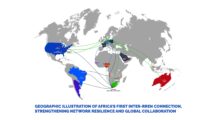African researchers, scientists and innovators often face one big challenge – visibility! Associated with this is – recognition! Related to the latter is – opportunity! Though researchers on this side of the world contribute somewhat to the global knowledge economy, UNESCO says this contribution is still minimal.
Well, the current status exists – not because Africans are contributing little, but rather because their scientific, scholarly works are not catching the attention they deserve. The reason for this ‘under visibility’ is multidimensional and multifaceted but let us zoom into one of them – inadequate knowledge and adoption of persistent identifiers (PIDs or PIs).
PIDs are unique digital identifiers that enable clear, reliable, and unambiguous connections between researchers and their scientific contributions over time and across changes of name, location, and institutional affiliation.
Let us attempt to describe PIDs in a simple way (to fit the context of this article): PIDs is a mechanism that links Maud (a researcher, scientist or innovator) to her former or current scholarly works, affiliations, grants, collaborations, speaking and teaching stints, making her easily identified, recognised and trustworthy for any ensuing, future opportunities (which could be grant application and funding, teaching, speaking or collaborative research).
This mechanism is familiar in the global research information ecosystem. Still, many African researchers are yet to get on the wagon. WACREN provided a platform at its recent conference in Accra to throw more light on PIDs and how researchers benefit from it in terms of visibility for their works and positioning them for opportunities in the future.
In a presentation by Lombe Thembo, a Grant Engagement Officer at ORCID, it was clear that PIDs hold a key to raising the profile of African researchers and their work, improving the discoverability of African research by making it easier for people to find and access research outputs. PIDs also help to enhance awareness of the impact of research conducted and also help to improve the sustainability of research.
By adopting PIDs, researchers in Africa can ensure that their contributions, some of which are seminal, are accurately attributed to them, which can lead to increased opportunities for collaboration, funding, and recognition.
African researchers are expected to adopt and optimise PIDs to enhance the visibility and recognition of their scholarly works, to the end, increasing Africa’s footprints on the global map of knowledge production.





